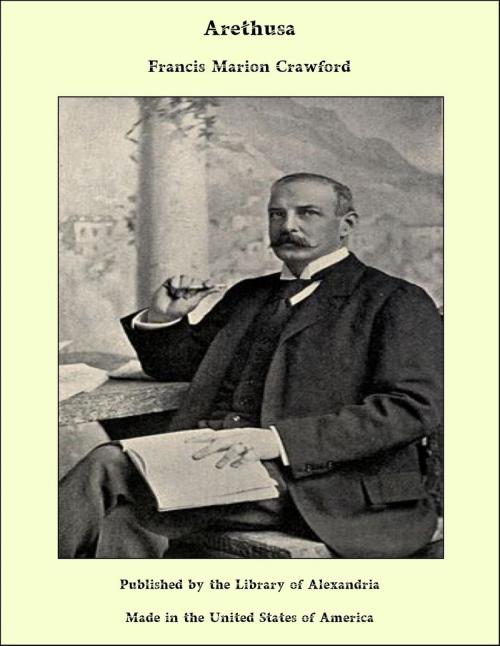| Author: | Francis Marion Crawford | ISBN: | 9781465604149 |
| Publisher: | Library of Alexandria | Publication: | March 8, 2015 |
| Imprint: | Language: | English |
| Author: | Francis Marion Crawford |
| ISBN: | 9781465604149 |
| Publisher: | Library of Alexandria |
| Publication: | March 8, 2015 |
| Imprint: | |
| Language: | English |
Carlo Zeno, gentleman of Venice, ex-clerk, ex-gambler, ex-soldier of fortune, ex-lay prebendary of Patras, ex-duellist, and ex-Greek general, being about twenty-nine years of age, and having in his tough body the scars of half-a-dozen wounds that would have killed an ordinary man, had resolved to turn over a new leaf, had become a merchant, and was established in Constantinople in the year 1376. He had bought a house in the city itself because the merchants of Genoa all dwelt in the town of Pera, on the other side of the Golden Horn. A Venetian could not have lived in the same place with Genoese, for the air would have poisoned him, to a certainty; and besides, the sight of a Genoese face, the sound of the Genoese dialect, the smell of Genoese cookery, were all equally sickening to any one brought up in the lagoons. Genoa was not fit to be mentioned within hearing of polite Venetian ears, its very name was unspeakable by decent Venetian lips; and even to pronounce the syllables for purposes of business was horribly unlucky. Therefore Carlo Zeno and his friends had taken up their abode in the old city, amongst the Greeks and the Bokharians, the Jews and the Circassians, and they left the Genoese to themselves in Pera, pretending that they did not even exist. It was not always easy to keep up the pretence, it is true, for Zeno had extremely good eyes and could not help seeing those abominations of mankind on the other side of the Golden Horn when he sat in his balcony on spring evenings; and his only consolation was to dream of destroying them wholesale, of hewing them in pieces by the hundred and the thousand, and of piling up pyramids of their ugly grinning heads. Why were they Genoese? Carlo Zeno would rather have taken a box on the ear from Sultan Amurad, the Turk, over there in Asia Minor, than a civil word from the least objectionable of those utterly unspeakable monsters of Genoese. 'Behold,' said Tertullian one day in scorn, 'how these Christians love one another.' Matters had not improved in eleven hundred years, since that learned Doctor of the Church had departed this life, presumably for a more charitable world; but Carlo Zeno would have answered that the Genoese were no more Christians than mules, and much less so than the pigs, which are all under the special protection of the blessed Saint Anthony.
Carlo Zeno, gentleman of Venice, ex-clerk, ex-gambler, ex-soldier of fortune, ex-lay prebendary of Patras, ex-duellist, and ex-Greek general, being about twenty-nine years of age, and having in his tough body the scars of half-a-dozen wounds that would have killed an ordinary man, had resolved to turn over a new leaf, had become a merchant, and was established in Constantinople in the year 1376. He had bought a house in the city itself because the merchants of Genoa all dwelt in the town of Pera, on the other side of the Golden Horn. A Venetian could not have lived in the same place with Genoese, for the air would have poisoned him, to a certainty; and besides, the sight of a Genoese face, the sound of the Genoese dialect, the smell of Genoese cookery, were all equally sickening to any one brought up in the lagoons. Genoa was not fit to be mentioned within hearing of polite Venetian ears, its very name was unspeakable by decent Venetian lips; and even to pronounce the syllables for purposes of business was horribly unlucky. Therefore Carlo Zeno and his friends had taken up their abode in the old city, amongst the Greeks and the Bokharians, the Jews and the Circassians, and they left the Genoese to themselves in Pera, pretending that they did not even exist. It was not always easy to keep up the pretence, it is true, for Zeno had extremely good eyes and could not help seeing those abominations of mankind on the other side of the Golden Horn when he sat in his balcony on spring evenings; and his only consolation was to dream of destroying them wholesale, of hewing them in pieces by the hundred and the thousand, and of piling up pyramids of their ugly grinning heads. Why were they Genoese? Carlo Zeno would rather have taken a box on the ear from Sultan Amurad, the Turk, over there in Asia Minor, than a civil word from the least objectionable of those utterly unspeakable monsters of Genoese. 'Behold,' said Tertullian one day in scorn, 'how these Christians love one another.' Matters had not improved in eleven hundred years, since that learned Doctor of the Church had departed this life, presumably for a more charitable world; but Carlo Zeno would have answered that the Genoese were no more Christians than mules, and much less so than the pigs, which are all under the special protection of the blessed Saint Anthony.















